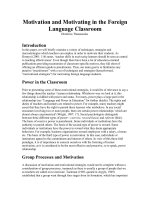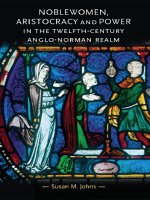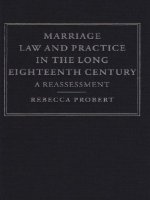gendering world politics issues and approaches in the post-cold war era
Bạn đang xem bản rút gọn của tài liệu. Xem và tải ngay bản đầy đủ của tài liệu tại đây (923.84 KB, 212 trang )
Gendering World Politics
Gendering World Politics
Issues and Approaches
in the Post–Cold War Era
J. Ann Tickner
columbia university press new york
Columbia University Press
Publishers Since 1893
New York, Chichester, West Sussex
Copyright ᭧ 2001 Columbia University Press
All rights reserved
Library of Congress Cataloging-in-Publication Data
Tickner, J. Ann.
Gendering world politics : issues and approaches in
the post-Cold War era / J. Ann Tickner
p. cm.
Includes bibliographical references and index.
ISBN 0–231-11366-8 (cloth : alk. paper) —
ISBN 0–231-11367-6 (pbk. : alk. paper)
1. Feminism. 2. World politics—1945– 3. Sex role—
Political aspects. 4. Nationalism and feminism.
5. Globalization. 6. Security, International.
I. Title.
HQ1154.T53 2001
305.42—dc21
00–047503
A
Casebound editions of Columbia University Press books
are printed on permanent and durable acid-free paper.
Printed in the United States of America
c10987654321
p10987654321
For Emma, Maxwell and Rose
Contents
Preface ix
Introduction: Gendering World Politics 1
1. Troubled Encounters: Feminism Meets IR 9
2. Gendered Dimensions of War, Peace, and Security 36
3. Gender in the Global Economy 65
4. Democratization, the State, and the Global Order: Gendered
Perspectives 96
5. Conclusions and Beginnings: Some Pathways for IR Feminist
Futures 125
Notes 149
Bibliography 171
Index 191
Preface
It is almost ten years since, in the preface to Gender in In-
ternational Relations, I asked the following questions: Why are there so few
women in my discipline of international relations? If I teach the field as
conventionally defined, why are there so few readings by women to assign
to my students? Why is the subject matter of my discipline so distant from
women’s lived experiences? Why have women been conspicuous only by
their absence in the worlds of diplomacy and military and foreign policy-
making?
When Gender in International Relations was published in 1992, there
were few texts in international relations that could help answer these ques-
tions. Today, thanks to the hard work of a growing community of feminist
scholars in IR, there are many. This book is a celebration of all the work
that has begun to provide answers to these questions and to challenge our
students to take gender and women seriously. These feminist scholars have
found women (and men) in places not normally considered part of the
discipline of international relations; in so doing, they have enlarged our
horizons and stimulated us to ask new and important questions about global
politics. It is still true, however, that outside this emergent feminist literature,
there are few “great books” in IR by women. While women students now
feel more comfortable in IR courses, there are still too few men who are
willing to take gender courses or courses that focus on women. In many
political science and IR departments, the IR curriculum still lacks serious
attention to gender issues. During the 1990s, women were admitted to most
x Preface
combat positions in the U.S. military, and the U.S. president appointed the
first female secretary of state, but occupations in foreign and military poli-
cymaking in most states remain overwhelmingly male, and usually elite
male. We may have provided some answers to my questions as to why IR
and foreign policymaking remain male-dominated; but breaking down the
unequal gender hierarchies that perpetuate these androcentric biases re-
mains a challenge.
While this book is a celebration of the feminist work of the last ten years,
it also attempts to situate this work within the quite profound transformation
that the discipline of IR has undergone during this period, when construc-
tivist and postpositivist approaches have challenged the “scientific” founda-
tions of the field. The deep questioning of the epistemological foundations
of a U.S dominated post–World War II IR that took place in the 1980s
helped to make space for feminist approaches. I hope that the audience for
this book will include scholars and students of IR who are seeking to broaden
their understanding of a field that has been profoundly altered by the realities
of the post–Cold War world.
This book also marks my own journeys through IR in the 1990s. I have
spent much of this time trying to understand why the intellectual gulf be-
tween different IR approaches is so wide and why conversations between
proponents of these various approaches can be so difficult. The luxury of a
semester at the Australian National University in Canberra in 1996 allowed
me time to talk and think deeply about these issues; chapter 1 of this volume,
which attempts to answer some of these questions, was the result. I want to
thank Andrew Mack and members of the Department of International Re-
lations at the Research School for Pacific and Asian Studies for providing a
supportive environment, and James Richardson, Gavan Mount, and Cindy
O’Hagen for their thoughtful comments on an earlier version of chapter 1.
Others in Australia to whom I owe a continuing special debt of gratitude are
Hilary Charlesworth and Jan Jindy Pettman. Besides her untiring support
for me and other feminist scholars, Jindy has worked hard to launch the first
feminist journal of international relations, the International Feminist Journal
of Politics.
Gender in International Relations adopted a framework built on the con-
cept of comprehensive security, a concept that reflects the influence of Scan-
dinavian peace research in my writings. Continuing to write and teach in
the area of peace research and peace studies challenges me to think about
how to foster better communication and understanding not only across lines
Preface xi
of conflict but also across disciplinary boundaries that can sometimes be as
divisive as “real-world” issues. For this reason, the recognition of my work
by the Department of Peace and Conflict Research at Uppsala University is
particularly cherished. A special word of thanks to Peter Wallensteen.
My travels have included a move from Boston to Los Angeles. The Col-
lege of the Holy Cross was a particularly supportive environment in which
to begin my unconventional intellectual journeys. While we may never
agree on our epistemological differences, I have always benefited from the
support and thoughtful comments on my work by Robert Keohane. I have
also appreciated the comments of Craig Murphy. In Los Angeles, I continue
to be supported by a vibrant feminist community; thanks to Jane Jaquette,
Carole Pateman, and especially Sandra Harding for her always insightful
comments, the influence of which appear throughout this book.
A quiet and beautiful fall on Block Island in 1999 allowed me some
focused time to finish this book. I thank Jonathan Aronson and the School
of International Relations at the University of Southern California (USC)
for granting me this “extra” time off after a sabbatical year that, for reasons
of health, was less productive than I had hoped. I also owe a very special
debt of gratitude to Kate Wittenberg at Columbia University Press for staying
with the project and encouraging me during what turned out to be a slower
than expected process. I truly appreciate Kate’s continued support not only
for my own work but also for supporting so many younger IR feminist
scholars.
While they are too numerous to name, I could never have completed
this particular journey without the friendship and advice of all the wonderful
scholars in the Feminist Theory and Gender Studies Section of the Inter-
national Studies Association. This section has become a very special place
for those of us working in this field. Before writing chapter 5, I asked some
of the scholars whose works I cited to offer their reflections on where they
think we have come in the last ten years. Thanks especially to L. H. M.
Ling, Jan Jindy Pettman, Elisabeth Pru¨ gl, and Jaqui True for their thoughtful
replies.
At USC I owe special thanks for the editorial and research assistance of
two of my graduate students: Leslie Wirpsa, who stepped in at the last mo-
ment under a tight deadline and helped me complete a first draft on time,
and Catia Confortini, who has worked with this project for several years.
Catia has provided invaluable assistance and encouragement throughout;
her careful and thorough research skills have allowed me to write away from
xii Preface
Los Angeles with the knowledge that there is always someone back there on
whom I can rely for prompt and professional assistance.
Finally, the support and encouragement of Hayward Alker, as well as that
of Joan, Heather, and Wendy, during the good as well as the not so good
times will always be remembered. As always, Hayward’s careful reading and
thoughtful comments on the manuscript are gratefully appreciated.
Gendering World Politics
Introduction: Gendering World Politics
The dramatic changes in world politics in the last ten years
have fueled a disciplinary ferment in the field of international relations (IR),
and new issues have stimulated new ways of understanding them. The end
of the Cold War and the consequent decline in the predominance of
military-security issues, defined in terms of the nuclear arms race between
the United States and the former Soviet Union, have contributed to the
decline of national-security studies, the heart of the discipline, at least in the
United States, since 1945. With war between the great powers being unlikely
in the near future, many IR scholars are focused on states’ economic, rather
than strategic, relationships. Previously obscured by the East/West rivalry, a
variety of new issues are now preoccupying the international relations se-
curity agenda. Ethnic conflicts and the clash of civilizations defy traditional
statist categories and balance-of-power or interest-based explanations; they
demand additional understandings of changing collective identities and the
role of culture in defining both identities and interests. Issues related to
economic globalization and democratization are also taking center stage.
While none of these issues is new, the IR discipline is taking increasing
notice of them, and ways to understand and explain them are proliferating.
Many of these new disciplinary areas of focus are ones where women
scholars and students of world politics seem to feel more at home than in
strategic studies; they are also areas where gender issues, such as the differ-
ential rewards of the current manifestations of economic globalization and
democratization, seem more obviously relevant.
1
It may not be coincidental,
2 introduction
therefore, that feminist perspectives on world politics entered the discipline
at about the same time as the end of the Cold War; over the last ten years,
they have been given increasing recognition. Certain introductory IR texts
are now including feminist approaches in their overview of the discipline,
and edited volumes and some anthologies have begun to include a chapter
on feminist approaches.
2
The title of this introduction, “Gendering World Politics,” both reflects
some of these changes and conceptualizes a worldview into which feminist
approaches fit more comfortably. While international relations has never
been just about relations between states, an IR statist focus seems even less
justified today than in the past. International politics cannot be restricted to
politics between states; politics is involved in relationships between inter-
national organizations, social movements and other nonstate actors, trans-
national corporations and international finance, and human-rights organi-
zations, to name a few. Decrying the narrowness of Cold War IR, Ken Booth
has suggested that the subject should be informed by what he calls a “global
moral science” that entails systematic enquiry into how humans might live
together locally and globally in ways that promote individual and collective
emancipation in harmony with nature. He goes on to suggest that the state,
the traditional frame for IR, “might be seen as the problem of world politics,
not the solution.”
3
Since women have been on the peripheries of power in most states, this
broad conception of world politics seems the most fitting disciplinary defi-
nition in which to frame feminist approaches. Their investigations of politics
from the micro to the global level and from the personal to the international,
as well as their analyses as to how macro structures affect local groups and
individuals, draw on a broad definition of the political. Using explicitly nor-
mative analysis, certain feminists have drawn attention to the injustices of
hierarchical social relations and the effects they have on human beings’ life
chances. Feminists have never been satisfied with the boundary constraints
of conventional IR.
4
While women have always been players in international
politics, often their voices have not been heard either in policy arenas or in
the discipline that analyzes them.
If the agenda of concerns for IR scholars has expanded, so too have the
theoretical approaches. The “scientific” rationalistic tradition,
5
associated
with both neorealism and neoliberalism, is being challenged by scholars in
critical and postpositivist approaches that grow out of humanistic and phil-
osophical traditions of knowledge rather than those based on the natural
Gendering World Politics 3
sciences. While certain scholars applaud this flowering of a multiplicity of
approaches and epistemologies,
6
others see a discipline in disarray with frag-
mentation and pluralism as its essential characteristics. Kalevi Holsti’s claim,
in the early 1990s, that there is no longer agreement on what constitutes
reliable or useful knowledge and how to create it still holds true today.
7
It is
in the context of this intellectual pluralism and disciplinary ferment that
feminist approaches have entered the discipline.
In spite of the substantial growth and recognition of feminist scholarship
in the last ten years, it still remains quite marginal to the discipline, particu-
larly in the United States, where neorealism and neoliberalism, approaches
that share rationalistic methodologies and assumptions about the state and
the international system, predominate.
8
Apart from occasional citations,
there has been little engagement with feminist writings, particularly by con-
ventional IR scholars.
9
There is genuine puzzlement as to the usefulness of
feminist approaches for understanding international relations and global
politics. Questions frequently asked of feminist scholars are indications of
this puzzlement: What does gender have to do with international politics
and the workings of the global economy? How can feminism help us solve
real world problems such as Bosnia? Where is your research program?
10
While the new feminist literatures in IR are concerned with understanding
war and peace and the dynamics of the global economy, issues at the center
of the IR agenda, their methodological and substantive approaches to these
questions are sufficiently different for scholars of IR to wonder whether they
are part of the same discipline.
It is this lack of connection that motivates many of the issues raised in
this book. While I have attempted to site feminist perspectives within the
discipline, it will become clear from the topics addressed that IR feminists
frequently make different assumptions about the world, ask different ques-
tions, and use different methodologies to answer them. Having reflected on
reasons for these disconnections, as well as the misunderstandings over the
potential usefulness of feminist approaches raised by some of the questions
above, I believe that they lie in the fact that feminist IR scholars see different
realities and draw on different epistemologies from conventional IR theorists.
For example, whereas IR has traditionally analyzed security issues either
from a structural perspective or at the level of the state and its decision
makers, feminists focus on how world politics can contribute to the inse-
curity of individuals, particularly marginalized and disempowered popula-
tions. They examine whether the valorization of characteristics associated
4 introduction
with a dominant form of masculinity influences the foreign policies of states.
They also examine whether the privileging of these same attributes by the
realist school in IR may contribute to the reproduction of conflict-prone,
power-maximizing behaviors.
11
Whereas IR theorists focus on the causes and
termination of wars, feminists are as concerned with what happens during
wars as well as with their causes and endings. Rather than seeing military
capability as an assurance against outside threats to the state, militaries are
seen as frequently antithetical to individual security, particularly to the se-
curity of women and other vulnerable groups. Moreover, feminists are con-
cerned that continual stress on the need for defense helps to legitimate a
kind of militarized social order that overvalorizes the use of state violence
for domestic and international purposes.
Conventional IPE has typically focused on issues such as the economicbe-
havior of the most powerful states, hegemony, and the potential for building
international institutions in an anarchic system populated by self-interested
actors; within a shared state-centric framework, neorealists and neoliberals
debate the possibilities and limitations of cooperation using the notion of
absolute versus relative gains.
12
Feminists more often focus on economic
inequality, marginalized populations, the growing feminization of poverty
and economic justice, particularly in the context of North/South relations.
Whereas IR has generally taken a “top-down” approach focused on the great
powers, feminist IR often begins its analysis at the local level, with individuals
embedded in social structures. While IR has been concerned with explain-
ing the behavior and interaction of states and markets in an anarchic inter-
national environment, feminist IR, with its intellectual roots in feminist
theory more generally, is seeking to understand the various ways in which
unequal gender structures constrain women’s, as well as some men’s, life
chances and to prescribe ways in which these hierarchical social relations
might be eliminated.
These different realities and normative agendas lead to different meth-
odological approaches. While IR has relied heavily on rationalistic theories
based on the natural sciences and economics, feminist IR is grounded in
humanistic accounts of social relations, particularly gender relations. Noting
that much of our knowledge about the world has been based on knowledge
about men, feminists have been skeptical of methodologies that claim the
neutrality of their facts and the universality of their conclusions. This skep-
ticism about empiricist methodologies extends to the possibility of devel-
oping causal laws to explain the behavior of states. While feminists do see
Gendering World Politics 5
structural regularities, such as gender and patriarchy, they define them as
socially constructed and variable across time, place, and culture; understand-
ing is preferred over explanation.
13
These differences over epistemologies
may well be harder to reconcile than the differences in perceived realities
discussed above.
Subsequent chapters of this book serve two purposes. First, they elaborate
upon and forge a better understanding of the ontological and epistemolog-
ical differences between feminists and IR scholars. These differences will
become evident as subsequent chapters move further away from traditional
IR concerns. Although security (the subject of chapter 2) is central to both
conventional IR and feminist perspectives, even though each approaches it
from quite different perspectives, democratization (one of the topics in chap-
ter 4) has not been central to IR as conventionally defined.
The second goal is to demonstrate what feminist approaches to IR are
contributing and can contribute to our understanding of global politics.
While not suggesting that they can tell us everything we need to know about
world politics, feminists are challenging us to see the inequality and domi-
nation aspects of “common sense” gender differences. For example, uncov-
ering previously hidden gender hierarchies in policy priorities or workplace
participation can show how they contribute to conflict and injustice in ways
that have detrimental effects on the security of both men and women. Much
of feminist analysis draws upon and intersects with that of scholars who
would not consider themselves part of the discipline of IR; this suggests that
feminists are charting their own voyages of discovery rather than staying
within the confines of the discipline. Debates as to how connected feminism
should be to the discipline are central to feminist discussions.
Acknowledging these concerns, chapter 1 attempts to situate feminist
scholarship within an increasingly fragmented discipline of IR. Subsequent
chapters do the same in a variety of issue areas. A sharp division between
realism and liberalism, and their neorealist and neoliberal versions, and
critical and postpositivist approaches is now evident in IR.
14
While there is
no necessary connection between postpositivism and feminism, many IR
feminists would identify themselves as postpositivists. Additionally, many
would be uncomfortable describing themselves as either liberals or realists.
For these reasons, they are closer to other critical approaches than to con-
ventional theory; they are distinctive, however, in that their work is also
grounded in contemporary feminist theoretical debates and by the fact that
all of them use gender as a central category of analysis.
6 introduction
Chapter 2 deals with war, peace, and security—issues that continue to
be central to the discipline. While realists see the contemporary system as
only a temporary lull in great-power conflict, others see a change in the
character of war, with the predominance of conflicts of state building and
state disintegration driven by ethnic and national identities as well as by
material interests. Since feminists use gender as a category of analysis, issues
of identity are central to their approach; chapter 2 explores the ways in which
the gendering of nationalist and ethnic identities can exacerbate conflict.
Feminists are also drawing our attention to the increasing impact of these
types of military conflicts on civilian populations. Civilians now account for
about 90 percent of war casualties, the majority of whom are women and
children. Questioning traditional IR boundaries between anarchy and dan-
ger on the outside and order and security on the inside, as well as the realist
focus on states and their interactions, feminists have pointed to insecurities
at all levels of analysis; for example, Katharine Moon has demonstrated how
the “unofficial” support of military prostitution served U.S. alliance goals in
Korea, thus demonstrating links between interpersonal relations and state
policies at the highest level.
15
Feminist analysis of wartime rape has shown
how militaries can be a threat even to their own populations;
16
again, femi-
nist scholarship cuts across the conventional focus on interstate politics or
the domestic determinants of foreign policy.
Feminists have claimed that the likelihood of conflict will not diminish
until unequal gender hierarchies are reduced or eliminated; the privileging
of characteristics associated with a stereotypical masculinity in states’ foreign
policies contributes to the legitimization not only of war but of militarization
more generally. Wary of what they see as gendered dichotomies that have
pitted realists against idealists and led to overly simplistic assumptions about
warlike men and peaceful women,
17
certain feminists are cautioning against
the association of women with peace, a position that, they believe, disem-
powers both women and peace. The growing numbers of women in the
military also challenges and complicates these essentialist stereotypes. To
this end, and as part of their effort to rethink concepts central to the field,
feminists define peace and security, not in idealized ways often associated
with women, but in broad, multidimensional terms that include the elimi-
nation of social hierarchies such as gender that lead to political and eco-
nomic injustice.
Chapter 3 focuses on economic globalization. Given an increase in in-
equality on a global scale, which has accompanied the latest round of eco-
Gendering World Politics 7
nomic globalization, feminists are questioning the optimistic prognoses of
liberal supporters of a Western-led globalizing economy. Focusing on pop-
ulations at the margins of the world economy, feminists call our attention
to the fact that while women’s positions vary according to race, class, and
geographical location, women are disproportionately situated at the bottom
of the socioeconomic scale in all societies; drawing on gender analysis, they
point to the devaluation of women’s work and the dichotomy between pro-
ductive and reproductive labor as explanations of the relatively disadvantaged
position of women and the growing feminization of poverty.
In an era characterized by the hegemony of neoliberal ideology, struc-
tural-adjustment policies have placed further burdens on women as govern-
ment programs have been scaled back and women have taken on unremu-
nerated welfare and caregiving functions previously assumed by the state.
Gender analysis highlights that structural-adjustment programs, along with
other economic policies and consequences of economic globalization, are
not gender neutral. Local resistances to these adverse effects, which often
go unnoticed, are acting as generators of new knowledge upon which femi-
nists are drawing to counter the growing neoliberal consensus.
Globalization involves more than economic forces; it has also led to the
spread of Western-centered definitions of human rights and democracy.
Feminist scholars are questioning whether these definitions are gender bi-
ased: for example, until very recently violence against women was not con-
sidered part of the international community’s human-rights agenda. Addi-
tionally, postcolonial feminists are drawing attention to the ways in which
Western feminism may itself be complicit in imposing a Western view of
democracy and rights that ignores issues of race and cultural differences.
Conversely, it is important to recognize that cultural reassertions against
Westernization are often framed in terms that result in the regulation and
control of women.
Feminists also claim that, while democratization is being celebrated by
Western liberals, new democracies are not always friendly toward women.
Feminists have traditionally been suspicious of what they see as the legacy
of the Western liberal-democratic tradition that they claim is patriarchal and
that, historically, has favored men’s over women’s interests. Additionally,
since women have traditionally had less access to formal political institu-
tions, the focus on state institutions by scholars of democratization may miss
ways in which women are participating in politics—outside formal political
channels at the grassroots level.
8 introduction
Chapter 4 investigates how different women impact and are impacted by
political institutions at all levels and what effect this may have on global
politics. It has been suggested that international organizations and global
institutions, which are further removed from democratic accountabilitythan
are states, may be even less receptive to women’s interests and gender issues.
If this is the case, it may be time for feminists to reassess their generally
critical view of the role of the state. In certain cases, democratization has
brought increased participation by women in the formal political process;
in others, it has not. Women’s participation in nongovernmental activities
has had similarly mixed effects. Their involvement in social movements
provides points of leverage on state policies that, because of democratic
accountability, offer the potential at least for more responsiveness than do
international organizations.
In these substantive chapters, I have chosen to focus on security, eco-
nomic globalization, and democratization because they are the topics that
concern much of the recent feminist IR literature; they are also the focus
of much of the critical scholarship in IR, scholarship with which feminist
IR has more affinity. Most of the feminist scholarship to be discussed in
this book has moved outside the traditional confines of the discipline; re-
cent studies demonstrate that feminist IR has moved beyond critique into
“second-stage” empirical research. Nevertheless, claims that feminist IR
lacks a research program will persist, due in part to the misunderstandings
over epistemology and methodology discussed earlier.
Abstracting and generalizing from the literatures discussed in earlier
chapters, chapter 5 outlines some feminist methodologies that are being
used for understanding world politics. Since, as I have already suggested,
feminist IR draws on local knowledge and examines issues not normally
considered part of the discipline, its research and methodologies will often
seem strange to conventional IR scholars. Practical reasoning, grounded in
everyday experience and conversational, interpretive frameworks are not
seen as “scientific” by a discipline committed to theories based on the natural
sciences and economics. It is hoped that by contributing to a better, more
informed understanding of feminist IR, this book can facilitate more fruitful
conversations among advocates and students of different persuasions in in-
ternational relations. Nevertheless, as this introduction demonstrates, these
conversations will remain troubled as long as there are such wide divides
between IR and feminist ontologies and epistemologies.
1
Troubled Encounters:
Feminism Meets IR
Since its inception, at the beginning of the century, the dis-
cipline of international relations has gone through a series of debates over
both its subject matter and the methodologies appropriate for its investiga-
tions.
1
None of these debates have been as fundamental as those of the last
two decades. The end of the Cold War and the plurality of new issues on
the global agenda, to which I referred in my introductory chapter, have been
accompanied by increasing calls for rethinking the foundations of a disci-
pline that appears to some to be out of touch with the revolutionary changes
in world politics, as well as deficient in how to explain them. Justin Rosen-
berg has suggested that it is strange that momentous events, such as the
collapse of Soviet Communism, the strains of European integration, and the
economic growth of China (which presently contains one-fifth of the world’s
population), events that are part of a gigantic world revolution of moderni-
zation, industrialization, nationalism, and globalization in which the West
has been caught up for the last two hundred years, tend to be excluded from
most IR theory.
2
Instead of what he claims are arid debates about hegemonic
stability or order versus justice, which abstract from real-world issues, Ro-
senberg calls for theory grounded in historical and social analyses. He sug-
gests that global issues can be better explained through narrative forms of
explanation rather than social-scientific methodologies of conventional IR.
Such calls for rethinking the way in which we explain or understand
world politics began in the 1980s, with the so-called third debate in IR;
3
the
1980s marked the appearance of a substantial body of scholarship, associated
10 troubled encounters
with critical theory and postmodernism, that challenged both the episte-
mological and ontological foundations of the field. Asserting that we had
moved from a world of states to a global community, R. B. J. Walker claimed
that the third debate represented a fundamental divide that went well beyond
methodological issues because it arose more from what scholars thought they
were studying than from disagreements as to how to study it.
4
While these
concerns are obviously interrelated, scholars on the critical side of the third
debate challenged the foundations of the field as well as the appropriate
methods by which it should be studied.
It is no coincidence that feminist theory came to IR, in the late 1980s,
at about the same time as this fundamental questioning of the foundations
of the discipline. Although there had been earlier literatures on women in
the military and on women and development, IR feminists pointed to the
gendered foundations of the field and began to develop feminist critiques
of the major assumptions of the discipline.
5
Although their definition of real-
world issues might be different from IR theorists’ abstractions, they, too, were
concerned with concrete issues embedded in what they claimed were gen-
dered social relations. Raising issues that had rarely been seen as belonging
in the discipline as conventionally defined, they also preferred theory
grounded in historical and social analysis.
Like the third debate in IR, feminist theory has also been engaged in a
critical discussion and reevaluation of epistemological issues. These debates
began earlier, however, in the 1960s, when radical feminists challenged the
empiricist foundations of liberal feminism; in many ways, they were more
genuine debates than those in IR, with scholars from a variety of epistemo-
logical and disciplinary perspectives, ranging from the natural and social
sciences to the humanities and philosophy, engaging openly with one an-
other. Questioning liberal assumptions that women’s subordination can be
diminished by incorporating women into existing institutional structures on
an equal basis with men, postliberal feminists pointed to hierarchical struc-
tures that would have to be radically challenged to address these issues. They
also claimed that knowledge about both the social and natural world is not
objective but based on the experiences of men.
Feminist IR scholars were drawn to this earlier interdisciplinary discus-
sion. As had other feminists in sociology, literature, and the natural sciences,
they perceived IR as a field, largely within political science, committed to
universalist, positivist methodologies that, they claimed, did not recognize
its gendered foundations; nor did it speak to the concerns that feminist schol-
Feminism Meets IR 11
ars brought to their investigations. Identifying with the postpositivist side of
the third debate, but critical of its silence on gender issues, feminist scholars
went outside the discipline to feminist theory to seek answers to their ques-
tions.
In this chapter, I first outline some of the approaches to feminist theory
and some of the debates between them—the debates dating back to the
1960s. This survey is intended to demonstrate how far the ontological and
epistemological concerns of feminist theory are from those of conventional
international relations and also why IR feminists have been drawn to them.
I then briefly review some of the earlier debates in IR, thereby demonstrating
their difference from feminist concerns. Finally, I introduce some feminist
IR perspectives, integrating them into the third debate. Although much femi-
nist IR scholarship demonstrates affinities with critical or postpositivist IR,
its roots in feminist theory, and its commitment to the importance of gender
as a category of analysis, make this body of literature distinctive and different.
In this chapter, I focus on the epistemological and methodological issues
raised by these feminist and IR debates, rather than on substantive issues in
world politics. These issues will be explored in subsequent chapters.
Feminist Theories
Feminist theories are multidisciplinary; they draw from both the social
and natural sciences as well as the humanities and philosophy. They include
a wide variety of epistemological and methodological approaches. Although
I shall outline some feminist theoretical approaches by presenting them
sequentially, it should be emphasized that many of these approaches still
coexist: the debates to which I refer are far from resolved. The key concern
for feminist theory is to explain women’s subordination, or the unjustified
asymmetry between women’s and men’s social and economic positions, and
to seek prescriptions for ending it.
6
Susan Okin defines feminists as those
who believe that women should not be disadvantaged by their sex; women
should be recognized as having human dignity equal with men and the
opportunity to live as freely chosen lives as men.
7
However, feminists dis-
agree on what they believe constitutes women’s subordination, as well as
how to explain and overcome it. Feminist theories have been variously de-
scribed as liberal, radical, socialist, psychoanalytic, postcolonial, and post-
modern.
8
Besides seeking better understanding of women’s subordination,
12 troubled encounters
most of these approaches see themselves as politically engaged in the prac-
tical tasks of improving women’s lives. While liberal feminists have generally
relied on empiricist methodologies, other approaches have questioned these
positivist methodologies. Arguing from standpoint or postmodern episte-
mological positions,
9
they claim that “scientific” theories, which claim the
possibility of neutrality of facts and a universalist objectivity, hide an epis-
temological tradition that is gendered. Below, I outline some of the major
features of these approaches as well as their epistemological orientations,
emphasizing issues that have been important for feminist IR. Acknowledging
that much of contemporary feminism has moved beyond these labels, they
are, nevertheless, helpful in understanding feminist thought in its historical
context.
10
It is important to emphasize that not all feminists think alike; the
diversity in feminist scholarship is often not recognized by IR scholars.
Liberal Feminism
Contemporary feminist theories have emerged out of a long historical
tradition of feminism that goes back to the seventeenth, eighteenth, and
nineteenth centuries and is associated with names such Christine de Pizan,
Mary Astell, Mary Wollstonecraft, and Harriet Taylor.
11
Each of these the-
orists argued that women should have the same chance to develop their
rational capacities as men. Liberal feminism is a continuing intellectual
tradition; in the United States, it is also associated with women activists and
organizations such as the National Organization for Women (NOW). While
many contemporary academic feminists have moved beyond liberal femi-
nism, it should not be underestimated; most reforms in Western liberal de-
mocracies that have benefitted women can be attributed to liberal feminism.
Resting on a conception of human nature that is radically individualistic,
whereby human beings are conceived as isolated individuals with no nec-
essary connection with each other, the liberal tradition sees humans as sepa-
rate rational agents.
12
Liberal feminists claim that discrimination deprives
women of equal rights to pursue their rational self-interest; whereas men
have been judged on their merits as individuals, women have tended to be
judged as female or as a group. Liberal feminists believe that these imped-
iments to women’s exercise of their full rational capacities can be eliminated
by the removal of legal and other obstacles that have denied them the same
rights and opportunities as men. When these legal barriers are removed,









